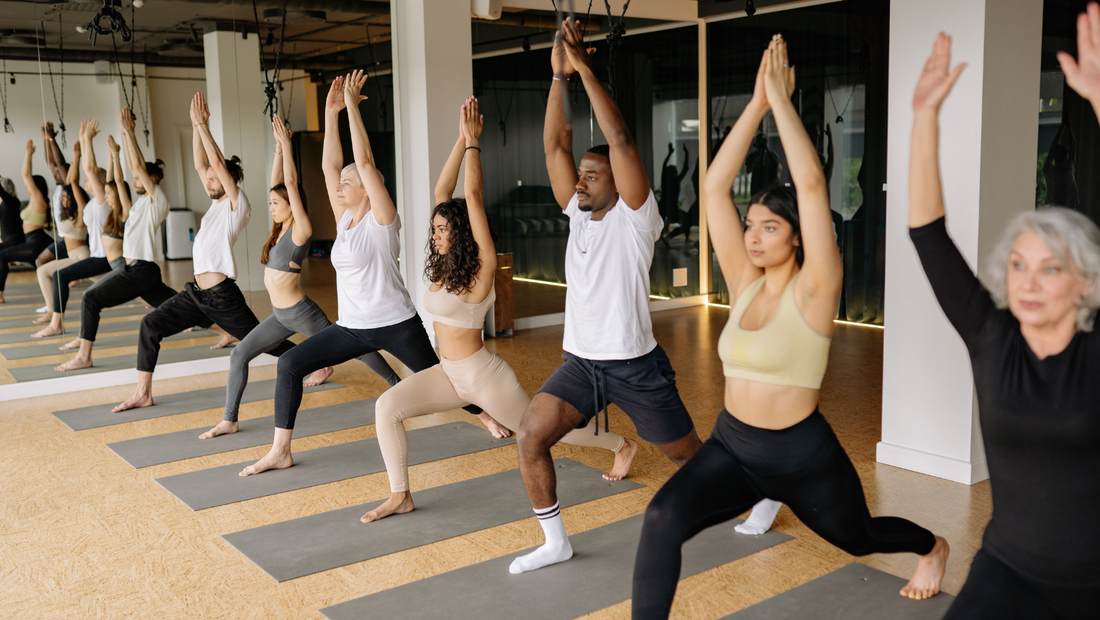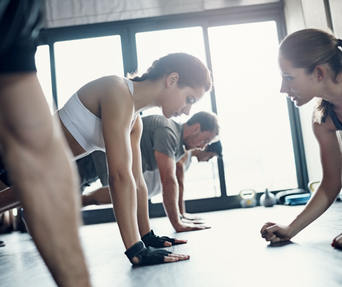 Don't fall off the treadmill (or bike, or rower, or...) New year's resolutions around fitness and exercise are incredibly popular. The excitement and hope generated by the start of the year makes starting an exercise program easy. Now that it's February, staying with it gets hard. Life gets busy, motivation drops, and suddenly you're back on the couch, wondering how you're 6 episodes into The Golden Bachelor instead of at the gym. You know the benefits of exercise - they're probably what motivated you to start exercising in the first place. If you need a reminder here are just a few: • 3 hours of exercise a week reduced pain and disability by 47% in people with knee arthritis. PTs are specially trained to help you learn to move with and avoid joint pain, we have doctorates! • Exercise reduced the progression of dementia by 50% • Exercise reduced the risk of hip fracture in post-menopausal women by 47% • A meta analysis showed exercise decreased anxiety by 48% • A low dose of exercise relieves depression in 30% of people, a higher dose works for 47% of people • A 12 year study of 10,000 Harvard alumni showed that people who exercised were 23% less likely to die • Exercise is the #1 treatment for fatigue Knowing that you should exercise or why you should exercise isn't the problem. Actually getting up and doing it is. Physical Therapists can help motivate you to move when you don't feel like it because you feel too weak or unsteady. Here are our top tips for making sure you stick to your exercise plan: Set realistic goals. Don't try to go from zero to hero overnight. Start with small, achievable goals and increase them gradually. Make it easy to win - that helps you build motivation and an exercise habit. For some people that might mean starting with a daily 10 minute walk. For some people, that bar is too high. When we say make it easy to win, we mean easy. Your goal could be to scan your card at the gym 3 times a week. It might be putting on your walking shoes and going out the door. It might be one pushup. Start tiny. Do activities you enjoy. Exercise ins't punishment. Choose activities that are fun. It could be running, walking the dog, dancing, swimming, kickboxing, or playing a sport. Schedule it. Schedule your workouts like you would any other important appointment. When people ask you to do something else during that time, say "sorry, I've got an appointment." The more you make exercise a routine, the less likely you are to skip it. Don't go it alone. Having someone waiting for you at the gym really motivates you to get there. Having support helps push you to work harder, and motivates you when you're feeling down. Your support could be a friend, the other people in a group fitness class, or a trainer. Physical Therapists are movement experts and can help guide you along the way, espeically if you have a previous injury that you are learning to work with. Mix it up. Try a new class. If you usually run at the same pace, try intervals. Walk a different route. Doing the same thing over and over again gets boring and leads to burnout. Keep things interesting to stay interested. Track your progress. Bonus points if you find a way to make it visual somehow. Our brains love to see tasks checked off, a chart or numbers going up, and rings closing. Seeing how far you've come is a great motivator. Keep track of your workouts in a journal, make a spreadsheet, use an app or fitness tracker. Bribes work. Celebrate your successes, no matter how small. Set a goal to work out 3 times this week and treat yourself to your favorite coffee when you do. Buy yourself a new workout outfit, get a massage, or anything else that will help you stay motivated when you reach milestones. Adjust. Don't push yourself too hard, especially when you're starting out. If you're feeling tired and sore, take the intensity down. Plan rest days into your routine. Don't make your goal and plan so rigid that it's impossible to complete in the real world. Forgive yourself! Everyone has setbacks. You're going to get sick. You're going to miss a workout. That's ok. Pick yourself up and get back on track. With the right mindset and a little perseverance, you can reach your fitness goals. References: 1. Updating ACSM’s Recommendations for Exercise Preparticipation Health Screening. Medicine & Science in Sports & Exercise 47(11):p 2473-2479, November 2015. https://journals.lww.com/acsmmsse/fulltext/2015/11000/updating_acsm_s_recommendations_for_exercise.28 .aspx 2. Benefits of exercise for older adults: a review of existing evidence and current recommendations for the general population. Clinics in geriatric medicine 8.1 (1992): 35-50. https://www.sciencedirect.com/science/article/abs/pii/S0749069018304968 3. Exercise Acts as a Drug https://bpspubs.onlinelibrary.wiley.com/doi/full/10.1111/j.14765381.2012.01970.x 4. Perceived Exercise Barriers https://doi.org/10.1002/art.22098 5. The Benefits of Exercise on Brain Health https://www.choosept.com/podcast/benefits-of-exercise-on-brain-health 6. Exercise Assessment and Prescription in the older adults and individuals at risk for functional decline https://learningcenter.apta.org/products/exerciseassessment-and-prescription-in-older-adults-and-individuals-at-risk-forfunctionaldecline?_gl=1*1c4v900*_ga*MTEwNjIzMzg2MS4xNjgxODQyODcw*_ga_ZZJK7 4HXNR*MTY5NzE5NzczNy4xMS4xLjE2OTcyMDAzODMuNTguMC4w&_ga=2.2 23614619.1495021570.1697197738-1106233861.1681842870 7. 23 and ½ hours: What is the single best thing we can do for our healtt. https://www.youtube.com/watch?v=aUaInS6HIGo 8. Time Magazine: How To Keep New Year's Resolutions: https://time.com/6243642/how-to-keep-new-years-resolutions-2/
0 Comments
 You know that physical activity is good for you. The benefits are well researched and the list is impressive. Here's just a sampling: ● Releases endorphins to make you feel good and fight depression ● Helps control weight ● Prevents diseases like stroke, diabetes and some forms of cancer ● Improves sleep ● Helps you live longer Recent studies even show that physical activity strengthens your immune system, with a protective effect against COVID, and that staying active through middle age protects your brain as you age. Physical activity is a wonder drug. If it was a pill, you'd buy it and take it every day. But even though activity is free, less than 25% of Americans meet the CDC recommendations for activity. We clearly need help. Physical Therapists Are The Experts in Human Movement To be active, you need to be able to move. Physical Therapists do more than help you recover from surgeries or major injuries. We are the experts in human movement. Sure, you could see a strength coach to lift weights, hire a personal trainer, go to a yoga class to work on your flexibility and balance, and see a chiropractor for adjustments. But that seems like a lot of people when a PT can help you with all of these things and more. Nobody knows more about human movement or looks at your health the same way a PT does. We can help you with every aspect of movement including strength, range of motion, flexibility, endurance, balance and coordination. As medical professionals we can help you with injuries or other issues. Your PT can work with your doctor to help use activity to manage things like diabetes, cholesterol levels or blood pressure instead of prescriptions. We are also trained to work with people of all ages, so you can develop a long-term relationship and we can continue to adjust and modify your routine as you age or your goals change. Stay Healthy For Life Staying active has a long list of benefits both now and in the future. But chances are you're not moving enough to make the most of those benefits. Most people need help. Physical therapists are the most qualified professional in existence to help keep you moving and healthy now and in the future. So don't only think of your PT as someone you see when you need help with pain or an injury. Think of us as your partner and coach working to help you keep moving and stay healthy for life. |
Archives
January 2024
Categories
All
|
- HOME
- About Us
-
Our Services
- Physical Therapy Evaluation
- Post Operative Care
- Neck & Back Pain, Joint Sprains & Strains
- PWR! Parkinson Wellness Recovery
- Vertigo, Balance Retraining & Vestibular Rehab
- TMJ, Headaches, Face Pain
- Lymphedema and CDT
- Sports Injuries
- General Conditioning - Post Covid Strengthening
- Functional Dry Needling
- Workers Comp & Work Conditioning
- Auto Accidents
- Augmented Soft Tissue Manipulation (ASTYM)
- Fall Prevention
- Testimonials
- Careers
- Contact Us
- MIMPT Blog
ADDRESS:52900 Garfield Rd
|
|

 RSS Feed
RSS Feed